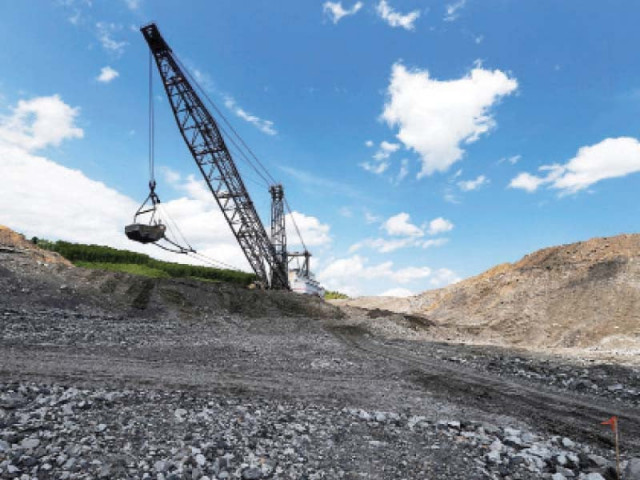Long-awaited rail track to ferry Thar coal okayed
Project entails linking Sindh desert area to Bin Qasim at Karachi

Against the backdrop of nationwide protests regarding soaring power bills and mounting tensions with a Chinese coal extraction partner in Thar, the federal government has delivered long-awaited approval for a critical infrastructure project.
The project entails the construction of a 105-kilometer railway line, linking Thar to Bin Qasim, with the aim to seamlessly connect the coal mines in Sindh to the national and global energy markets.
The strategic railway track will serve as a lifeline for Thar's abundant coal reserves, ensuring their efficient transportation to power projects across the country.
The primary objectives are to augment the contribution of cost-effective coal-based energy in Pakistan's energy mix and to alleviate the financial burden on end-consumers by lowering overall power bills.
Furthermore, this railway network will facilitate the supply of Thar coal to fertilizer and cement manufacturers, offering the potential for coal-to-gas conversion.
Currently, coal transportation relies heavily on trucks, which proves to be an expensive and time-consuming method, unsuitable for large-scale bulk supply increases.
Read 'Liquified fuel from Thar coal can replace imported petrol'
In a recent conversation with The Express Tribune, Abu Bakar Ahmed, secretary of the Sindh Energy Department, revealed that he had obtained federal approval for the construction of a 105-kilometer railway line, spanning from Chorr to Islamkot, ultimately connecting to Port Qasim, a deep-sea port in Karachi.
This ambitious project is slated for completion by December 2024 and is estimated to cost Rs58 billion, with equal financial participation from both the federal and Sindh governments.
The overarching vision behind this endeavor is to transition 4-5 thermal power projects currently reliant on imported coal to Thar coal, thereby reducing the nation's import bills.
Pakistan currently spends approximately $2 billion annually on coal imports.
Thar coal ranks among the top two most economical energy sources in Pakistan's diverse energy landscape, with power projects using Thar coal consistently offering some of the most cost-effective energy solutions among the country's 74 power projects.
While Pakistan currently receives around 3,500 megawatts of power from coal-fired projects, the country's peak power demand reached 25,500 megawatts in August 2023.
Notably, coal-fired power projects were virtually nonexistent in Pakistan a few years ago. Secretary Ahmed emphasized that sustained power production in Pakistan necessitates reliance on fossil fuels, and Thar coal stands out as one of the most cost-effective fuel options available.
He highlighted the challenges faced in establishing power projects near the coal mines, including water scarcity and inadequate power transmission infrastructure in the Thar region.
Thus, the strategic shift to rail transport for coal distribution across the country is imperative. This transition also opens up the possibility of coal exports if necessary.
Also read ‘Project to convert Thar coal into liquid fuel begins’
Thar coal, classified as lignite, shares similar combustion and moisture characteristics with the coal Germany has extensively utilized for decades. India has almost fully depleted its coal reserves in the Rajasthan region.
Pakistan, in contrast, possesses a staggering 175 billion tons of coal reserves in Tharparkar alone, equivalent to 50 billion tons of oil equivalent (TOE)—surpassing the oil reserves of Saudi Arabia and Iran combined, according to the Sindh Engro Coal Mining Company (SECMC).
While these coal reserves could potentially meet Pakistan's electricity demand for centuries, their application extends beyond power generation, opening avenues for diverse utilization.
Ahmed said the escalating use of expensive fuels such as imported furnace oil has driven the cost of power production to a record high of Rs72 per unit, compared to Rs28 per unit just two years ago.
This surge in production costs is a major contributor to the recent surge in electricity bills, which has prompted public protests. Thar coal emerges as a viable and sustainable solution to the ongoing power crisis, with its increased utilization expected to alleviate the financial burden on consumers.
Meanwhile, the China Machinery Engineering Corporation (CMEC), the operator of a Chinese coal mine in Thar Block-II, has issued a warning, stating that it will halt coal extraction activities unless outstanding receivables of $50 million are settled by September 10.
CMEC conveyed its concerns to the Sindh Engro Coal Mining Company (SECMC) through a letter, revealing that it did not receive any payments in August, resulting in overdue receivables of $50 million as of July 2023.



















COMMENTS
Comments are moderated and generally will be posted if they are on-topic and not abusive.
For more information, please see our Comments FAQ